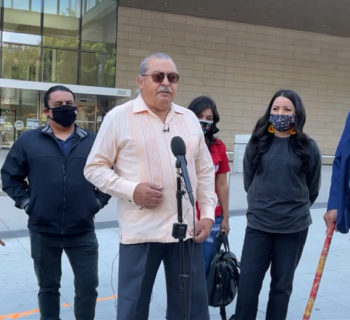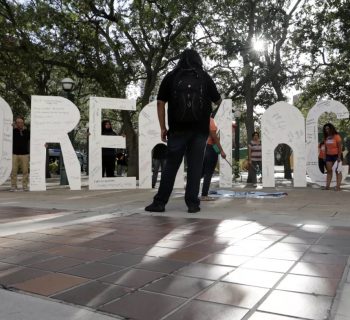Opinion by the Seattle Times Editorial Board | MAY 25, 2022 | Art image by Paul Tong
The never-ending stream of divisive rhetoric around immigration and the southern border has long hindered comprehensive reform, as both Democrats and Republicans have made political hay out of a broken system.
The latest flashpoint is the end of Title 42, a Trump-era border-control measure that upended the legal rights of asylum-seekers under the guise of protecting public health during the pandemic. The matter is currently tied up in the courts but some U.S. senators seek to extend the order until 2025.
That would be unconscionable as well as counterproductive.
Instead of swiftly deporting migrants and interfering with the legal processmeant to protect those fleeing persecution, Congress should focus on solutions that not only tackle the factors that draw people to cross the border illegally but also acknowledge and address the labor needs of the United States.
One of those common-sense options is the Farm Workforce Modernization Act. It is the kind of clear-eyed, practical legislation that deserves attention.
Proposed by U.S. Reps. Dan Newhouse, R-Wash., and Zoe Lofgren, D-Calif., the legislation passed the House in 2021 with bipartisan support but has so far stalled in the Senate.
The act would give some immigrant workers without legal permission to be in the U.S. a path to legal status and streamline the visa-application process to make it easier for foreign workers to come here legally. It would also require employers to verify a worker’s identity and employment authorization.
Immigrants make up more than 70% of U.S. farmworkers.
“Most farmers would agree that the No. 1 issue they face is the lack of labor. Crops don’t harvest themselves,” Newhouse, the state’s former agriculture director, said in a news release. “This legislation would secure a legal, and reliable, workforce for all of agriculture.”
Along with the impact on farm work and the nation’s food supply, labor shortages are a contributing factor to widespread inflation, according to the U.S. Chamber of Commerce, which has called for an increase in legal immigration to help solve the problem.
Over the last nine months, the number of unfilled nonfarm jobs has consistently surpassed 10 million. Data for March shows there are more than 11 million unfilled positions in the U.S. labor market.
“We hear from businesses every day that the worker shortage is their top challenge, and it’s impacting the country’s ability to ease supply-chain disruptions, get inflation under control and continue our economic recovery,” said Neil Bradley, the chamber’s executive vice president and chief policy officer.
Chamber-proposed solutions include permanent legal protections for immigrants that now have Temporary Protected Status, agricultural workers and young immigrants brought into the country illegally by their parents, known as Dreamers.
This is not just big business looking for cheap labor. Polls have consistently shown that most Americans support legal immigration, yet elected representatives just as consistently have failed to enact comprehensive reform.
The political realities ensure that will not change anytime soon, but the House’s bipartisan support of the Farm Workforce Modernization Act shows that modest steps are possible.
This legislation is only a small piece of the larger immigration puzzle, but its positive impact on the lives of immigrants and the U.S. economy should push the Senate to ensure that it falls into place.







